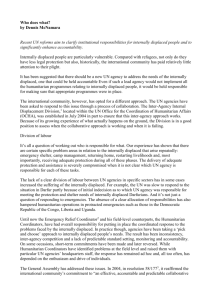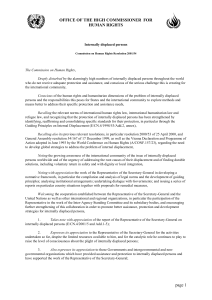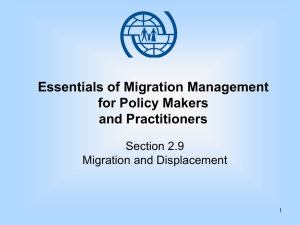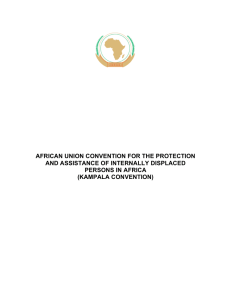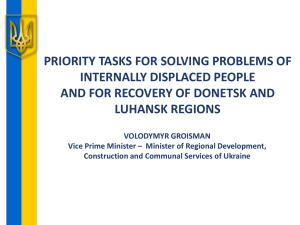File - Housing and Shelter in Haiti
advertisement
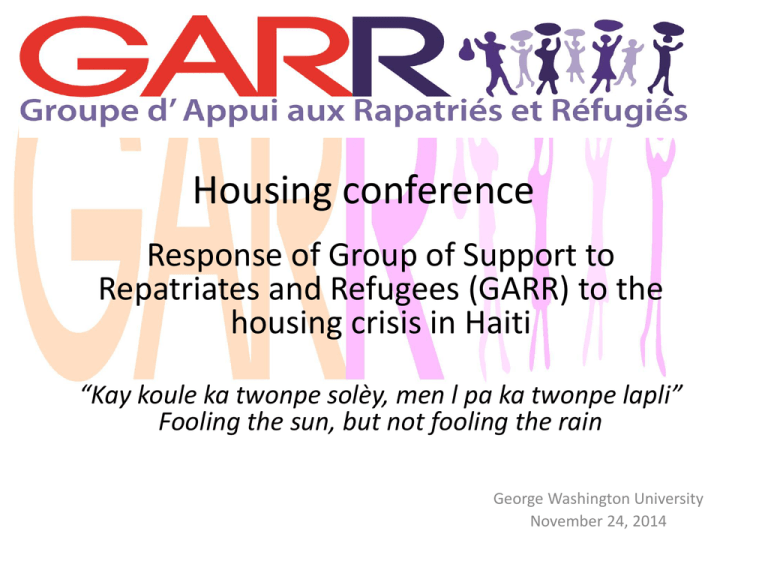
Housing conference Response of Group of Support to Repatriates and Refugees (GARR) to the housing crisis in Haiti “Kay koule ka twonpe solèy, men l pa ka twonpe lapli” Fooling the sun, but not fooling the rain George Washington University November 24, 2014 Presentation of GARR • Founded in 1991 to face a humanitarian disaster caused by the repatriation and expulsion of more than 75,000 people from the Dominican Republic • Intervention in favor of internally displaced people after the earthquake of 2010 Mission and Vision • Mission of GARR GARR’s mission is to promote the respect and defense of the rights of migrants. It concentrates its efforts on repatriates, refugees, users of the Haitian-Dominican border, and since the earthquake of January 12, 2010 in Haiti, on internally displaced people. • Vision of GARR GARR believes that migration is a social, global phenomenon, that includes positive and negative aspects for both the country of origin and the host country. Respecting the rights of immigrants can contribute to bringing people closer together, as well as social justice and solidarity in society. Objectives • General objective of GARR – Promote and defend the rights of migrants in regard to the establishment of more just and solidary relations between people. • Specific objectives – Develop advocacy activities in order to change policies, practices and laws that are unfavorable to migrants, to adopt decisions that are likely to improve their living conditions, and to promote good relations between people, particularly between Haiti and the Dominican Republic. – Encourage local initiatives for the organization of a more dignified welcome of repatriates, refugees and other migrants, humanitarian and legal assistance to victims of violations of human rights. – Facilitate the reintegration and rehabilitation in Haiti of repatriates, refugees and displaced people. Area of intervention • Southern part of the border area – Centre department • Belladère • Lascahobas • Thomassique – West department • Anse-à-Pitre • Fond-Verrettes Work axes • Advocacy • Reception of victims, humanitarian assistance, reintegration/social rehabilitation • Organizational strengthening Situation of the area right after the earthquake • Four (4) camps of internally displaced people – Decauvil : 96 families – Juampa : 84 families – Platanal : 26 families – Chambouin : 46 families 252 families with 3 people minimum and 10 maximum Interventions of GARR • • • • • • • • Advocacy Humanitarian assistance Payment of rent Construction of houses Income generating revenues Training Follow-up and evaluation Transfer of responsibilities Advocacy • Advocacy campaigns have taken place on the right on lodging • More than 226 articles published • A partnership has been developed with Amnesty International • Creation of 9 housing cooperatives: 5 at Plateau Central (KOLOTA, KOLOMM, KLAD, KOLOSO, KOLOTA) and 4 within the West department (MUSOL, KOLOS, KOLOLAM, COSOLS) • Advocacy with the National Council of Cooperatives for a law governing the housing cooperatives • Participation at the round table on housing • Recommendation for the writing of a document of a national plan on housing Humanitarian assistance 252 internally displaced families have received humanitarian assistance at the Plateau Central 500 families have received humanitarian assistance in Port-au-Prince Payment of rent • 200 families at Plateau Central • 250 families in Port-au-Prince, West department Construction of houses 85 houses were built at the Plateau Central, Belladère and Lascahobas: – 10 at Dos Bois Rouge, locality of the section of Juampas, – 7 at Roche Mulâtre, locality of the section of Petit Fond, – 34 at the solidarity village, section of Juampas; – 7 in the commune of Belladère, – 25 in Décauvil – 2 in the community of Lacoline Dimension and cost of houses • Surface of houses: 42.5 m2 • Cost per house: $ 8,000 US Construction of houses Land for construction • The land where the solidarity village was built is a gift of the local authorities. The deputy played an important role in the negotiations. • Landowners, especially in the localities of Décauvil, Dos-Bois-Rouge and Roche Mulatre, benefited from a house on their respective properties. Special considerations • The houses were built according to earthquake-resistant principles • The materials used were tested by specialists before their use at the construction • 90% of the materials were collected within the localities. This has not only considerably reduced costs, but it has also allowed the support of the local economy. • The support of the participants/beneficiaries has been accounted for in the budget of the construction of each house (their support is estimated at about 20% of expenses) • The participants were consulted about the architecture of the houses before the launch of the project • The recommendations of the participants were taken into account during the implementation of the project Income generating activities Training Some selection criteria • Internally displaced people for the solidarity village • Single-parent families with several children • Solidary families who received internally displaced people. They benefited from a construction at their property. • Families without revenues Follow-up and evaluation • At the Plateau Central, in Lascohabas, there is no longer a camp. • A village was built with 34 houses for internally displaced people, the majority of whom was living in a tent after the earthquake. Transfer of responsability • Management of the solidarity village has been entrusted to the housing cooperative KOLOSO • Management of the systems of supply of drinking water entrusted to the committees in collaboration with the National Direction of Drinking Water and Sanitation (DINEPA) • 425 youth were trained in manual professions Funding sources • Christian Aid • ICCO • Kerk In Actie • Etc. Summary of recommendations • • • • • • • • • • • • Set up a real national housing plan Set up social projects of housing with living spaces Dissolve the Unit of Construction of Houses and Public Buildings (UCLBP) Strengthen capacities of the Public Enterprise of Promotion of Social Housing (EPPLS) Encourage housing cooperatives Create a legal framework for social housing cooperatives Fund social housing projects set up by housing cooperatives Favor access to credit for social housing Favor access to credit for income generating activities of small and medium enterprises Make credit available to farmers Make technologies available that allow the optimization of harvests Involve the participants/beneficiaries in all phases of housing projects Thank you
